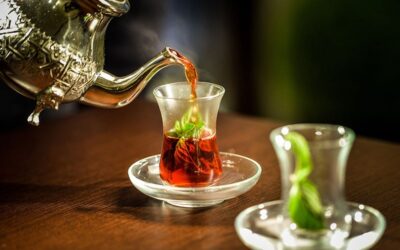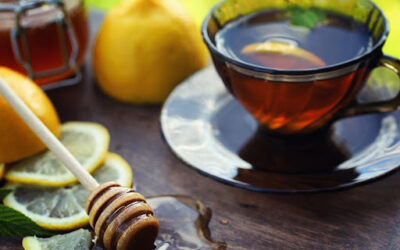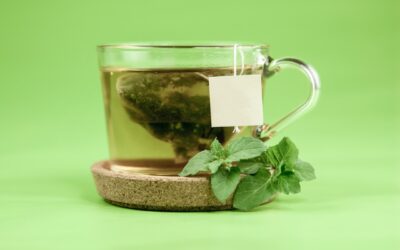Hibiscus Tea Nutrition Facts
Ever wondered what are the Hibiscus Tea Nutrition Facts? Hibiscus tea is a herbal beverage created by steeping hibiscus plant pieces in hot water. It can be consumed hot or cold and has a sour flavor akin to cranberries.
The USDA claims that one cup of hibiscus in its natural state has the following nutritional benefits:
| Calories | 28 |
| Protein | 0.5 g |
| Fat | 0 g |
| Carbohydrates | 6 g |
| Fiber | 0 g |
| Sugar | 0 g |
What Is Hibiscus?
Hibiscus is a species of flowering plant that is indigenous to India and Malaysia. It is also known as Hibiscus sabdariffa or roselle.
Hibiscus comes in many forms, including herbs, trees, and bushes. The most popular variety is Hibiscus sabdariffa, a shrub with broad, yellow blooms that change to pink, red, and red stalks.
Is Hibiscus Good For You?
Hibiscus seeds, flowers, leaves, and stalks have been utilized in culinary and traditional medicine for countless years. Today, hibiscus-flavored jams, jellies, sauces, syrups, and teas are available worldwide.
Health Benefits Of Hibiscus Tea
- Protects with antioxidants
- Fights inflammation
- Lowers blood pressure
- Lowers cholesterol
- Promotes weight loss
- Fights bacteria
- Supports liver health
Is Hibiscus Safe?
According to the U.S. Food and Drug Administration (FDA), hibiscus is safe to eat when added to food. The herb could, however, cause an allergic reaction. Hibiscus may harm the liver when consumed in extremely high doses.
How To Make Hibiscus Tea?
- Put the water in a pot and add the hibiscus flowers
- In a big pot, heat the hibiscus flowers and water until they begin to boil. Turn off the heat and cover the vessel as the water starts to boil. Add in the lime juice and honey until completely mixed, then strain.
- Serve either hot or cold.
Hibiscus Tea Recipe
- 2 cups Fresh Hibiscus flowers or ½ cup Dried Hibiscus Flowers
- 8 cups water
- ¼ cup Honey
- 3 tablespoons lime juice
Hibiscus Tea Effects
Contains Antioxidants
Antioxidants are chemicals that combat substances known as free radicals, which harm your cells.
Potent antioxidants found in hibiscus tea may help prevent sickness and damage brought on by the overproduction of free radicals.
Lowers Blood Pressure
Hibiscus tea has many remarkable and well-known advantages, one of which is that it may lower blood pressure.
High blood pressure can weaken the heart by putting it under additional strain. A higher risk of heart disease is also linked to high blood pressure.
According to several studies, Hibiscus tea may reduce systolic and diastolic blood pressure.
Lowers Blood Sugar
Hibiscus may be your key to healthy blood sugar levels if you’re a person with type 2 diabetes who needs assistance managing their condition.
According to animal studies, hibiscus extract reduced blood sugar levels by 12%. Hibiscus won’t send your levels through the roof because it is also low in sugar and calories. For people with diabetes searching for a luscious healing tea to help, the extra benefit of being able to raise HDL cholesterol levels and decrease LDL levels provides another fascinating viewpoint.
Affects Cholesterol
Millions of Americans struggle with high cholesterol, leading to catastrophic illnesses like heart attacks and stroke. Hibiscus has decreased cholesterol levels in some clinical investigations but not in others.
Affects Your Weight
According to several studies, hibiscus tea may aid in weight loss and guard against obesity.
In one experiment, 36 obese volunteers were given hibiscus extract or a placebo. Hibiscus extract decreased body weight, body fat, body mass index, and hip-to-waist ratio after 12 weeks.
Antibacterial Properties
Single-celled germs, known as bacteria, are capable of causing a wide range of diseases, including bronchitis, pneumonia, and urinary tract infections.
Hibiscus has been shown in several test-tube tests to have antibacterial and anticancer effects in addition to antioxidants.
FAQs
Does Hibiscus Tea Cause Hallucinations?
Hibiscus tea hallucinations have not been proven to be real by science to this point. Researchers haven’t investigated this side effect, nor the causes of the symptoms people report experiencing. Hibiscus is, after all, known to be safe and rarely causes harmful side effects.
How Much Hibiscus Tea Can You Drink?
Even if drinking hibiscus tea does not put your health at risk, it is still advised to avoid going overboard. It is advised to keep your daily intake to no more than 2-3 cups.
What You’ll Need To Make Hibiscus Tea At Home
- 2 cups Fresh Hibiscus flowers or ½ cup Dried Hibiscus Flowers
- 8 cups water
- ¼ cup Honey
- 3 tablespoons lime juice
- Put the water in a pot and add the hibiscus flowers
- In a big pot, heat the hibiscus flowers and water until they begin to boil. Turn off the heat and cover the vessel as the water begins to boil. Add in the lime juice and honey until thoroughly mixed, then strain.
- Serve either hot or cold.
Put the water in a pot and add the hibiscus flowers In a big pot, heat the hibiscus flowers and water until they begin to boil. Turn off the heat and cover the vessel as the water begins to boil. Add in the lime juice and honey until completely mixed, then strain. Serve either hot or cold." } }] }

Step-By-Step Egyptian Tea Recipe (& It’s Benefits)
There are several ways to prepare hibiscus or Egyptian Tea from recipes . Everything depends on how strong and sweet your preferred beverage is. You may drink karkade hot or chilled. Most...
How To Make Honey Citrus Mint Tea
It should be no surprise that honey citrus mint tea has various health advantages, especially during the colder months. Lemon, honey, and mint combined with warm herbal tea make for a very soothing...
How To Make Mint Tea
Peppermint, originally from the Middle East and Europe, is now grown worldwide. Peppermint was utilized as medicine by ancient civilizations like the Greeks and Egyptians. Traditional Persian...




0 Comments